Israel said on Thursday that 37 international NGOs operating in Gaza had not complied with a deadline to meet "security and transparency standards," in particular disclosing information on their Palestinian staff, and that it "will enforce" a ban on their activities.
The groups will now be required to cease their operations by March 1, which the United Nations has warned will exacerbate the humanitarian crisis in the war-ravaged Palestinian territory.
"Organizations that have failed to meet required security and transparency standards will have their licenses suspended," the Ministry of Diaspora Affairs and Combating Antisemitism said in a statement on Thursday.
Several NGOS have said the requirements contravene international humanitarian law or endanger their independence, while Israel has faced international criticism in the run-up to the deadline.
Israel says the new regulation aims to prevent bodies it accuses of supporting terrorism from operating in the Palestinian territories.
"The primary failure identified was the refusal to provide complete and verifiable information regarding their employees, a critical requirement designed to prevent the infiltration of terrorist operatives into humanitarian structures," the ministry said.
In March, Israel gave a ten-month deadline to NGOs to comply with the new rules, which demand the "full disclosure of personnel, funding sources, and operational structures."
The deadline expired on Wednesday.
The 37 NGOs "were formally notified that their licenses would be revoked as of January 1, 2026, and that they must complete the cessation of their activities by March 1, 2026," the ministry said Thursday.
- 'Weaponization of bureaucracy' -
Minister of Diaspora Affairs and Combating Antisemitism Amichai Chikli said: "The message is clear: humanitarian assistance is welcome - the exploitation of humanitarian frameworks for terrorism is not."
Numerous prominent humanitarian organizations have been hit by the ban, including Doctors Without Borders (MSF), World Vision International and Oxfam, according to the list provided by the ministry.
In the case of MSF, Israel accused it of having two employees who were members of Palestinian groups Islamic Jihad and Hamas.
MSF said earlier this week that the request to share a list of its staff "may be in violation of Israel's obligations under international humanitarian law" and said it "would never knowingly employ people engaging in military activity".
On Thursday, 18 Israel-based left-wing NGOs denounced the decision to ban their international peers, saying "the new registration framework violates core humanitarian principles of independence and neutrality."
"This weaponization of bureaucracy institutionalizes barriers to aid and forces vital organizations to suspend operations," they said.
On Wednesday, United Nations rights chief Volker Turk described Israel's decision as "outrageous", calling on states to urgently insist Israel shift course.
"Such arbitrary suspensions make an already intolerable situation even worse for the people of Gaza," he said.
UN Palestinian refugee agency chief Philippe Lazzarini said the move sets a "dangerous precedent".
"Failing to push back against attempts to control the work of aid organizations will further undermine the basic humanitarian principles of neutrality, independence, impartiality and humanity underpinning aid work across the world," he said on X.
- 'Catastrophic' -
On Tuesday, the foreign ministers of 10 countries, including France and the United Kingdom, urged Israel to "guarantee access" to aid in the Gaza Strip, where they said the humanitarian situation remains "catastrophic".
A fragile ceasefire has been in place in Gaza since October, following a deadly war waged by Israel in response to Hamas's unprecedented attack on Israeli territory on October 7, 2023.
Conditions for the civilian population in the Gaza Strip remain dire, with nearly 80 percent of buildings destroyed or damaged by the war, according to UN data.
About 1.5 million of Gaza's more than two million residents have lost their homes, said Amjad Al-Shawa, director of the Palestinian NGO Network in Gaza.









